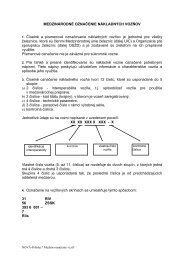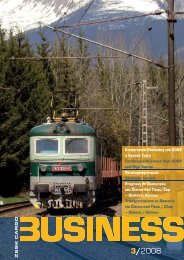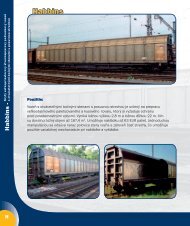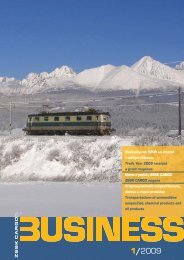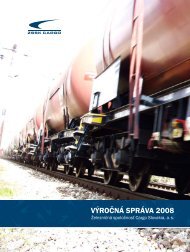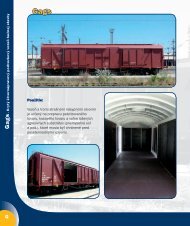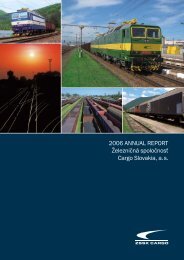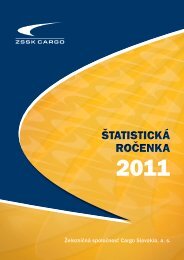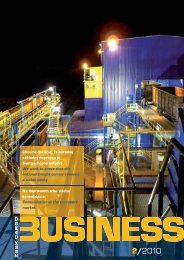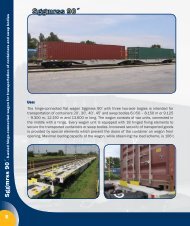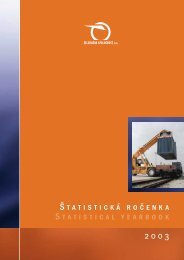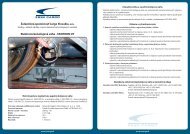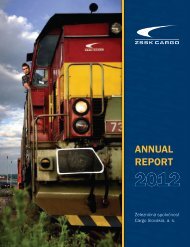CARGO BUSINESS 1-10.indd - ZSSK Cargo
CARGO BUSINESS 1-10.indd - ZSSK Cargo
CARGO BUSINESS 1-10.indd - ZSSK Cargo
- No tags were found...
You also want an ePaper? Increase the reach of your titles
YUMPU automatically turns print PDFs into web optimized ePapers that Google loves.
krízu využiť vo svoj prospech<br />
The French want to benefit from the crisis<br />
All of Europe, France included, was hit by the economic crisis, which<br />
resulted in an extreme decrease in demand from October 2008.<br />
Prices for raw materials fell sharply due to reduction of production<br />
in automobile and construction sector; there was a collapse in the<br />
European steel market. Companies were continuously reducing their<br />
stock levels – this is how Mr. Jérôme Meline, representative of the<br />
French railways (SNCF) for Central and Eastern Europe described the<br />
situation in his country.<br />
Decline in production and transportation<br />
The highest decline was indicated in the automotive sector where the<br />
manufacturing of new cars in 2009 was 20-25% lower than in 2008.<br />
Steel production, which was 5-20% lower, copied this decrease.<br />
Manufacturing of chemical products was reduced as well. Certain<br />
areas, in particular production of inorganic products, petrochemicals<br />
and polymers, were affected to a great extent, leading to closure of<br />
some factories.<br />
Railways deal with consequences of the crisis<br />
Various railways in Europe have coped with the situation in different<br />
ways. In the Czech Republic, Denmark, Great Britain and Estonia, they<br />
acceeded to radical cost savings, reduction of employment and scope<br />
of services as well as they cut salaries of top managers. In Germany<br />
and Belarus, they reduced the price for transportation in order to<br />
maintain their customers. As a result of crisis, privatization in Poland<br />
and Denmark was postponed.<br />
But the crisis does not have to be seen as only negative – Mr. Meline<br />
emphasized. The companies should focus their strength on how to<br />
use this negative situation and turn it into positive one. This way,<br />
the economic crisis can also be used as a stimulus for structural<br />
changes in a company and its stabilization. In order to maintain the<br />
performance, each company needs to increase its flexibility and adapt<br />
its pricing policy to the needs of the target group. The crisis offers new<br />
opportunities for partnerships; it opens up the space for negotiations.<br />
For the first six months of 2009, company SNCF reported a turnover of<br />
12 billion EUR, a decline of 4% against the previous year. The biggest<br />
decline occurred, in particular, in freight and logistics division of SNCF<br />
Geoodis, where there was a fall of 15.6%, from over 4 billion EUR to<br />
3.4 billion.<br />
Development projects of SNCF<br />
SNCF Fret has recently launched several projects. One of them was to<br />
offer transportations of heavy trains according to European standards.<br />
For this purpose, four new positions were created: train manager<br />
specializing in shuttle combined transportation services, direction<br />
north-south, train manager for agricultural products, train manager<br />
for transportations of coal, iron and steel, with a focus on northeast<br />
direction and ports of Antwerp and Dunkirk and an agent for<br />
transportations of oil, chemical products and automobile production<br />
for south-east direction. Another development strategy of SNCF<br />
Fret is a new concept for transportation of single wagon shipments,<br />
which is based on their optimization and carriage performed on the<br />
basis of a specific, regular transportation plan, while the volumes of<br />
transportations would be contracted with customers.<br />
In the field of combined transport, a sharp increase is expected, due<br />
to acquisition of company Novatrans and support of terminals. New<br />
shuttle Ro-La trains from Luxembourg to Perpignan, from Lille to Turin<br />
and from Lille to Paris and to Hendaye and high-speed freight trains on<br />
the route Paris - Bordeaux - Montauban - Toulouse and Paris - Lyon -<br />
Avignon - Miramas – Marseille are in operation.<br />
Acquisition of new markets<br />
The company continues to expand to Europe by means of external<br />
growth, as well as creating partnerships. In April 2008, SNCF acquired<br />
75% of German private railway undertaking ITL, which provides<br />
traction services on majority of international routes in direction<br />
east-west and vice versa for the transportations of coal, oil products<br />
(methanol, mineral oils, kerosene) and chemical products (ammonia),<br />
building materials (cement), agricultural products, containers, steel<br />
products and other.<br />
Currently, the acquisition of railway undertakings Veolia in Germany,<br />
the Netherlands and Italy is being prepared. Veolia <strong>Cargo</strong> Germany<br />
is the biggest private rail freight operator in Germany. It consists of<br />
ten subsidiaries, employs nearly 600 people and it had a turnover of<br />
around 160 million EUR in 2008. By this partnership, company SNFC<br />
will take over the control of Rail4Chem, which shall provide for closer<br />
access to the German market and strategic Betuwe Line.<br />
Jana BARČIAKOVÁ<br />
Trade Division<br />
Jérôme MELINE<br />
Jérôme Méline pracuje ako zástupca spoločnosti SNCF pre strednú<br />
a východnú Európu. Momentálne žije v Čechách. Na železniciach<br />
pracuje od roku 1997 a prešiel rôznymi pozíciami. Začínal ako<br />
prednosta stanice Gretz (FR), neskôr prešiel rôznymi riadiacimi<br />
funkciami - či už prevádzkovými alebo kontrolingovými, až nakoniec<br />
v januári 2009 nastúpil na dnešnú pozíciu. Okrem francúzštiny hovorí<br />
plynulo po anglicky, nemecky a česky.<br />
Jérôme Méline works as a representative of company SNCF for Central<br />
and Eastern Europe. He is currently living in the Czech Republic. He<br />
has been working in railways since 1997 and has had different jobs.<br />
He started as a stationmaster of station Gretz (FR), then he had<br />
several jobs in management, either in operation or in controlling, and<br />
finally he undertook his current post in January 2009. In addition to<br />
French, he speaks fluent English, German and Czech.<br />
20/21



